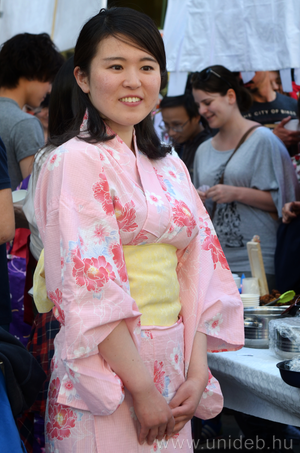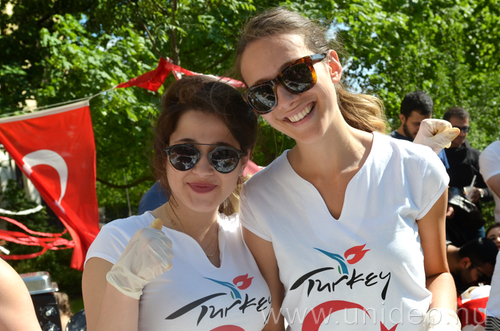 The University of Debrecen has concluded agreements for cooperation with hundreds of partner universities due to its extensive international relations.
The University of Debrecen has concluded agreements for cooperation with hundreds of partner universities due to its extensive international relations.
The University of Debrecen is in a prominent position among Hungarian higher education institutions in term of (both incoming and outgoing) mobility. The most significant mobility program is the EU-funded Erasmus+ program but numerous other programs (CEEPUS, ISEP, Fulbright, bilateral agreements, Campus Mundi) are available for faculty and students to gain experience abroad. The most popular form of mobility among students of the University of Debrecen is the mobility for learning: about 150 students travel abroad using this type of mobility annually.
There was a growth in the number of students participating in the Erasmus+ program’s mobility for traineeship in the previous period, in line with the EU objectives. Thus the number of students from the university participating in traineeships abroad was above one hundred.
The University of Debrecen could welcome 470 international exchange students in the last three years only within the framework of the Erasmus+ program, mostly with mobility for learning but there was an increase in the number of those participating in traineeships as well. Further increase could be realized in this regard by making the city more attractive. The number of part-time exchange students from all mobility programs was well above 500 in the period mentioned.
 Besides the Erasmus program, the other program that encouraged mobility the most in the 2012–2015 period was Campus Hungary, with the University of Debrecen participating with outstanding success among the universities of Regions of Convergence; considering the first five Campus Hungary calls for applications it performed best thus granting an opportunity for close to 3,000 students and staff to get mobility abroad. The university expects significant further increase in student mobility as a result of the Campus Mundi program started in 2016.
Besides the Erasmus program, the other program that encouraged mobility the most in the 2012–2015 period was Campus Hungary, with the University of Debrecen participating with outstanding success among the universities of Regions of Convergence; considering the first five Campus Hungary calls for applications it performed best thus granting an opportunity for close to 3,000 students and staff to get mobility abroad. The university expects significant further increase in student mobility as a result of the Campus Mundi program started in 2016.
It is another priority for the university to be present in international research also through the international researchers who work here. In the 2014/15 academic year a total of 102 foreign citizens arrived at the University of Debrecen to do research from 31 countries and in all cases they were employed within the framework of grants or projects. The Erasmus+ program provides an excellent opportunity for short-term visits (1-2 weeks) by international scholars.
 Besides partnerships in education, the University of Debrecen has an extensive network related to international research cooperation as well. In the 7th EU Framework Program for Research and Technological Development the University of Debrecen won more than 50 projects in cooperation with its European partners, and so occupies a prominent position in the funding ranking for FP7 projects among Hungarian universities and colleges. Several prestigious universities can be found among the members of the consortium: the University of Palermo, Manchester Metropolitan University, Newcastle University, and Cambridge University. The majority of FP7 projects were implemented in the fields of medical science, natural science, and agricultural science and the set objectives were realized in collaboration with numerous higher education institutions.
Besides partnerships in education, the University of Debrecen has an extensive network related to international research cooperation as well. In the 7th EU Framework Program for Research and Technological Development the University of Debrecen won more than 50 projects in cooperation with its European partners, and so occupies a prominent position in the funding ranking for FP7 projects among Hungarian universities and colleges. Several prestigious universities can be found among the members of the consortium: the University of Palermo, Manchester Metropolitan University, Newcastle University, and Cambridge University. The majority of FP7 projects were implemented in the fields of medical science, natural science, and agricultural science and the set objectives were realized in collaboration with numerous higher education institutions.
Our institution has already submitted a significant number of applications in the Horizon 2020 program and in the future it intends to further strengthen its international research collaborations.
Our institution has already submitted a significant number of applications in the Horizon 2020 program and in the future it intends to further strengthen its international research collaborations. In recent years, besides the FP7 grants, our university has also been able to access significant resources from the Hungary-Romania Cross-border Co-operation (HURO) program in consortium with Romanian partner universities, the Hungary-Slovakia Cross-border Co-operation (HUSK) program with Slovakian research institutions, and has received funding from the grants of the Visegrád Fund, Interreg, and Central Europe programs. Although we have significantly improved and extended our contacts and partnerships with other institutions of higher education there are still many opportunities in this regard.
To achieve our goals in internationalization, we need to increase the number of faculty members and students participating in mobility programs and participate more intensively in international research programs. This can be achieved with the use of external resources and the more effective and intensive use of our own funds. It is also desirable to broaden the already existing contacts and partnerships with the business sphere by involving more international partners.